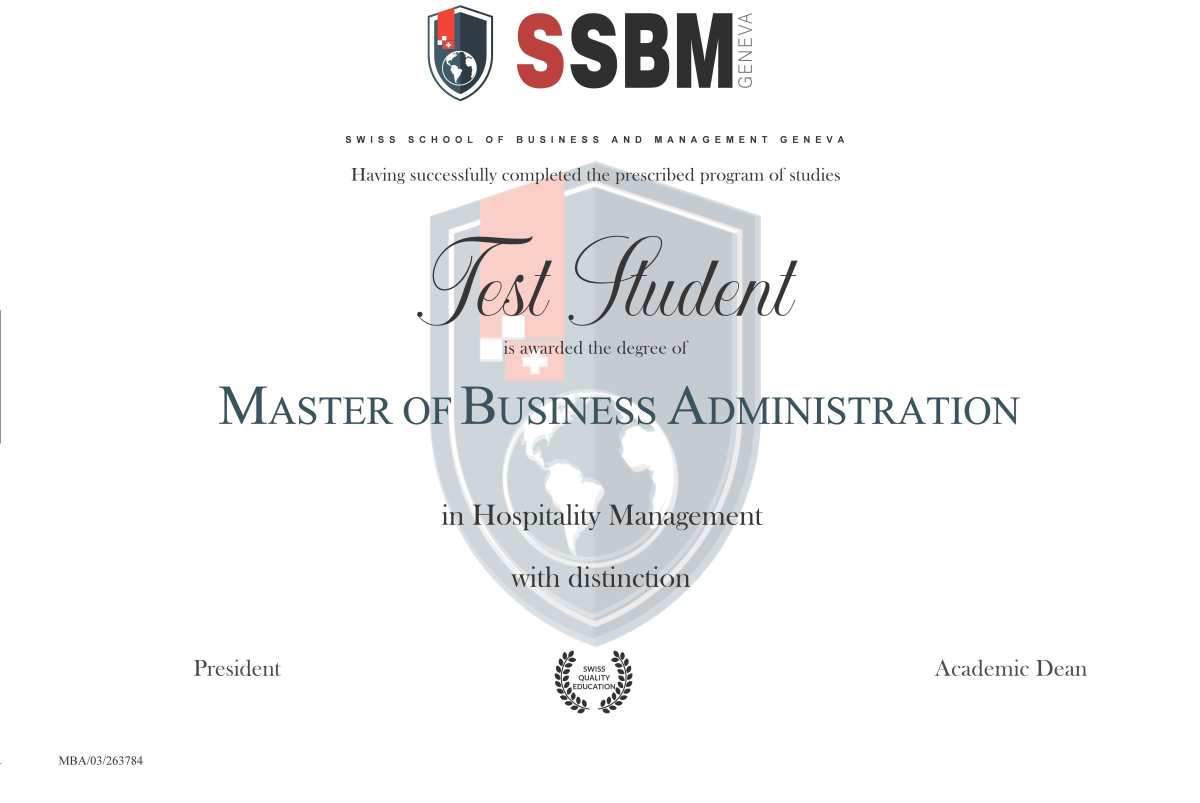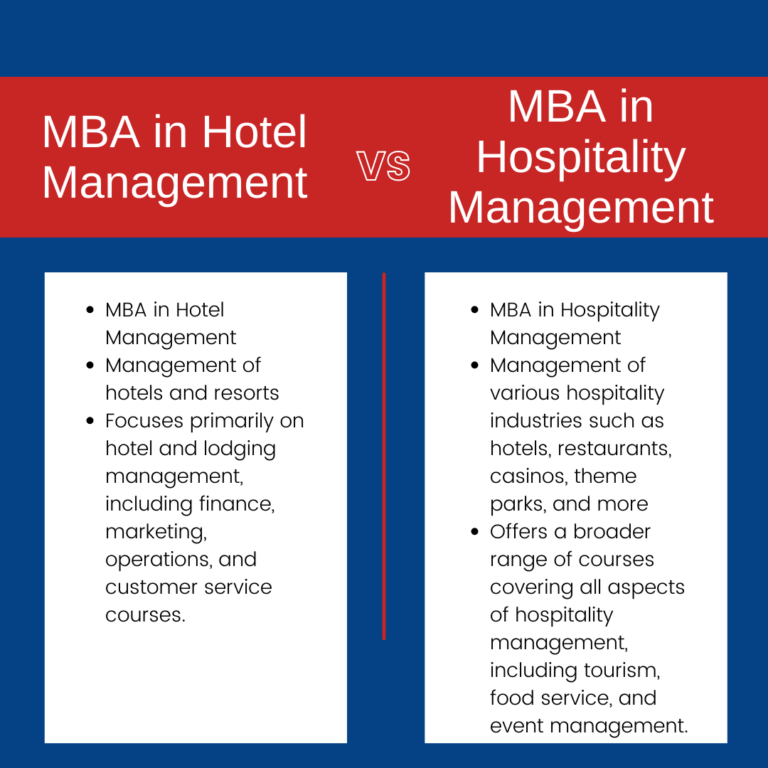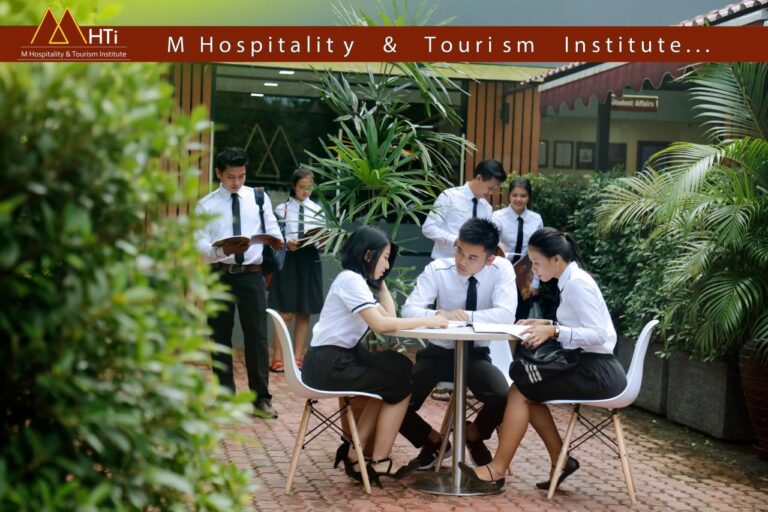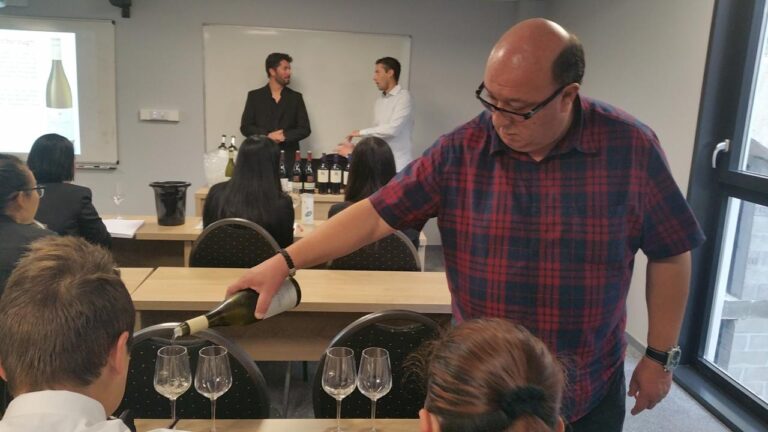Hotel Industry Online MBA A Comprehensive Guide
Hotel Industry Online MBA programs are transforming the hospitality landscape, offering a flexible and convenient pathway to advanced management roles. This rapidly growing field demands professionals with strong business acumen and specialized hospitality knowledge, and online MBA programs are uniquely positioned to meet this need. These programs cater to a diverse student body, including working professionals seeking career advancement and recent graduates eager to launch successful careers in the dynamic world of hotels and resorts.
We’ll explore the curriculum, career prospects, and key considerations for prospective students.
This guide delves into the specifics of online Hotel Industry MBA programs, examining the market demand, curriculum details, faculty expertise, career prospects, and accreditation standards. We will compare various programs, analyze their strengths and weaknesses, and provide valuable insights to help aspiring hospitality leaders make informed decisions about their future.
Market Analysis of Online MBA Programs in the Hotel Industry

The demand for online MBA programs specializing in the hotel industry is steadily increasing, driven by the need for hospitality professionals to upskill and adapt to the evolving landscape of the sector. This growth is fueled by technological advancements, globalization, and the increasing importance of data-driven decision-making in hotel management. The flexibility and accessibility of online learning make it an attractive option for working professionals seeking career advancement without disrupting their current employment.
Current Demand and Student Demographics
The current demand reflects a significant market opportunity. Many established hotel chains and independent properties recognize the value of employees with advanced business acumen and specialized hospitality knowledge. This translates into a strong demand for graduates equipped with the skills to manage revenue, optimize operations, and navigate the complexities of the modern hospitality market. Key demographics include experienced hospitality professionals seeking promotions, individuals transitioning into the hotel industry from related fields, and international students aiming to enhance their global career prospects.
The typical student is likely to be aged between 28 and 45, with several years of professional experience in the hospitality or a related sector. Many are already working in management positions and seek to enhance their leadership skills and strategic thinking capabilities.
Curriculum Comparison of Online MBA Programs in Hospitality
Online MBA programs focused on hospitality vary in their curriculum emphasis, but generally include core business subjects such as finance, accounting, marketing, and operations management. These are supplemented by specialized courses tailored to the hotel industry. Some programs might emphasize revenue management and pricing strategies, while others may focus on hotel operations, technology integration, or sustainable hospitality practices.
For instance, one program might offer a deep dive into digital marketing strategies for hotels, while another might prioritize supply chain management within the hospitality sector. The variation reflects the diverse needs and career aspirations of the student body. Some programs may incorporate industry-specific software training, simulations, and case studies to provide a practical, hands-on learning experience.
Career Paths for Graduates
Graduates of online MBA programs in the hotel industry have access to a wide range of career paths. They can pursue roles such as hotel general managers, revenue managers, directors of operations, marketing managers, and various other leadership positions within hotel chains, management companies, or independent properties. Many also find opportunities in consulting, working with hotels to improve their efficiency and profitability.
The advanced skills gained in areas like financial analysis, strategic planning, and digital marketing make graduates highly competitive candidates for senior management positions. The enhanced understanding of global hospitality trends also opens doors to international career opportunities.
Tuition Fees, Program Duration, and Specializations
The following table compares tuition fees, program duration, and specializations offered by five example online MBA programs (Note: These are illustrative examples and actual program details may vary. Always refer to the respective university websites for the most up-to-date information).
| Program Name | Tuition Fees (USD, approximate) | Program Duration | Specializations |
|---|---|---|---|
| Example University A | $50,000 – $70,000 | 18-24 months | Revenue Management, Hotel Operations |
| Example University B | $40,000 – $60,000 | 12-18 months | Digital Marketing in Hospitality, Sustainable Tourism |
| Example University C | $60,000 – $80,000 | 24 months | Luxury Hotel Management, Global Hospitality |
| Example University D | $35,000 – $55,000 | 15-21 months | Hospitality Finance, Human Resources in Hospitality |
| Example University E | $45,000 – $65,000 | 18 months | Event Management, Food and Beverage Management |
Curriculum and Skill Development

An online MBA in the Hotel Industry provides a comprehensive curriculum designed to equip students with the necessary skills and knowledge to excel in this dynamic sector. The program blends theoretical foundations with practical applications, focusing on the unique challenges and opportunities presented by the modern hospitality landscape. This ensures graduates are well-prepared for leadership roles within the industry.
Core Subjects in an Online Hotel Industry MBA Program
A typical curriculum includes core business subjects adapted to the hotel industry context. These foundational courses provide a solid understanding of management principles and their application within hospitality. Students will gain expertise in areas crucial for effective leadership and strategic decision-making. Examples of core subjects include financial accounting for hotels, hospitality operations management, strategic management in hospitality, and revenue management.
Additionally, many programs incorporate specialized modules focusing on areas like human resource management within hotels, marketing and sales strategies for the hotel industry, and legal and ethical considerations in hospitality.
The Importance of Digital Marketing and Technology Skills in the Modern Hotel Industry
The hotel industry is rapidly evolving, with technology playing an increasingly significant role in all aspects of operations, from guest booking and check-in to customer service and loyalty programs. Digital marketing is essential for attracting and retaining guests in a competitive market. Online MBA programs recognize this and incorporate specialized training in areas such as search engine optimization (), social media marketing, online reputation management, revenue management systems, and property management systems (PMS).
Proficiency in these areas is crucial for managing hotel operations effectively and maximizing profitability in today’s digital environment. For example, understanding principles allows hotels to improve their online visibility and attract more potential guests through organic search results. Similarly, effective use of social media can build brand awareness and foster direct engagement with guests.
Integration of Practical Experience Through Case Studies and Simulations
Online MBA programs in the hotel industry often employ case studies and simulations to bridge the gap between theory and practice. Case studies present real-world scenarios faced by hotels, allowing students to analyze situations, propose solutions, and develop critical thinking skills. Simulations provide a risk-free environment to practice decision-making in dynamic situations, such as managing occupancy rates or responding to unexpected events like a sudden surge in bookings or a crisis management scenario.
For example, students might analyze a case study of a hotel struggling with declining occupancy rates, identifying the underlying issues and developing a strategic plan to improve performance. Alternatively, a simulation might challenge students to manage a hotel’s revenue during a peak season, requiring them to make strategic decisions about pricing, inventory management, and marketing.
Examples of Projects and Assignments Developing Crucial Skills
Several projects and assignments are designed to enhance specific skills. A revenue management project might involve developing a dynamic pricing strategy for a hotel based on real-time data and market demand. This project would require students to analyze historical data, forecast future demand, and optimize pricing to maximize revenue. A customer relationship management (CRM) project could involve designing a loyalty program to improve guest retention and satisfaction.
This project would necessitate understanding customer segmentation, loyalty program mechanics, and the effective use of CRM software.
Sample Course: Sustainable Hospitality Practices
This elective course explores the growing importance of sustainability in the hotel industry. The course will cover topics such as:* Environmental Sustainability: Strategies for reducing energy consumption, water usage, and waste generation in hotels. This will include case studies of hotels implementing sustainable practices and discussions of relevant certifications such as LEED.
Social Sustainability
Ethical labor practices, community engagement, and promoting diversity and inclusion within the hotel workforce and guest experience. Students will explore initiatives like fair-trade sourcing and employee well-being programs.
Economic Sustainability
Strategies for achieving long-term financial viability while adhering to sustainable practices. This will include discussions on the financial benefits of sustainability and the role of green marketing in attracting environmentally conscious guests.
Implementation and Measurement
Practical strategies for implementing sustainable practices in hotels and measuring their effectiveness. This section will involve analyzing metrics like carbon footprint, water usage, and waste reduction. Students will also learn about relevant reporting frameworks and certifications.The course will incorporate case studies of hotels that have successfully implemented sustainable practices, guest surveys, and interviews with industry experts to provide real-world insights.
A final project will involve developing a comprehensive sustainability plan for a chosen hotel, incorporating all aspects discussed in the course.
Faculty and Learning Resources
A successful online MBA in the hotel industry relies heavily on the expertise of its faculty and the quality of its learning resources. These programs attract students seeking advanced knowledge and practical skills, making the faculty’s qualifications and the learning environment crucial components of the overall educational experience. The accessibility and effectiveness of online learning platforms and support services are equally important in ensuring student success.
Faculty Qualifications and Industry Experience
Faculty members in reputable online MBA programs in the hotel industry typically possess extensive experience in the sector, complementing their academic credentials. Many hold advanced degrees (PhDs or MBAs) from leading universities, often specializing in hospitality management, tourism, or related fields. Their professional backgrounds frequently include senior management positions in major hotel chains, consulting firms specializing in the hospitality industry, or roles in academia conducting research relevant to the sector.
For example, a professor might have a PhD in hospitality management and 20 years of experience as a general manager for a luxury hotel brand, bringing real-world insights to the classroom. This blend of academic rigor and practical experience ensures that the curriculum is both theoretically sound and practically applicable.
Online Learning Platforms and Technologies
Leading online MBA programs utilize sophisticated learning management systems (LMS) to deliver a seamless and engaging learning experience. These platforms typically offer a range of features, including interactive video lectures, downloadable course materials, discussion forums, online assessments, and collaborative project spaces. Examples of commonly used technologies include Blackboard, Canvas, and Moodle. Beyond the core LMS, many programs integrate other tools, such as video conferencing software (Zoom, Microsoft Teams) for live sessions and webinars, and project management software (Asana, Trello) to facilitate group work.
The use of these technologies ensures accessibility from various devices and locations, promoting flexibility for busy working professionals.
Support Services: Career Counseling and Networking Opportunities
Online MBA programs recognize the importance of career advancement for their students. Therefore, comprehensive support services are usually provided, including career counseling and networking opportunities. Career counseling often involves personalized guidance on resume writing, interview skills, and job searching strategies. Networking opportunities may include online forums dedicated to career discussions, virtual career fairs connecting students with potential employers, and alumni networks providing mentorship and industry connections.
For instance, some programs organize virtual networking events with industry leaders, providing students with opportunities to build relationships and gain valuable insights into current trends. These services aim to bridge the gap between academic learning and professional success.
Facilitating Collaboration Among Students, Hotel industry online MBA
Online learning platforms are designed to foster collaboration, despite the geographically dispersed nature of the student body. Discussion forums within the LMS allow for asynchronous communication, enabling students to engage in debates, share ideas, and support each other. Group projects, often facilitated through collaborative document editing tools and project management software, encourage teamwork and the development of crucial interpersonal skills.
Live online sessions, such as webinars or virtual office hours, offer opportunities for synchronous interaction and real-time problem-solving among students and faculty. These collaborative features are integral to the online learning experience, mimicking the dynamic interactions of a traditional classroom environment.
Online Libraries and Databases
Access to extensive online libraries and databases is a critical component of any reputable online MBA program. Students typically have access to a wide range of academic journals, industry reports, and e-books relevant to the hotel industry. These resources support in-depth research, the development of well-supported arguments, and the completion of assignments. Access to databases like EBSCOhost, ProQuest, and JSTOR is common, providing students with a wealth of information at their fingertips.
Many programs also provide access to specialized hospitality industry databases, providing up-to-date market intelligence and competitive analysis tools. This robust access to information is crucial for students to succeed in their studies and stay abreast of industry trends.
Career Prospects and Salary Expectations
An online MBA in the hotel industry equips graduates with the strategic management skills and industry-specific knowledge highly sought after by employers. This translates into diverse career opportunities and competitive salary prospects, significantly enhancing career advancement within the hospitality sector. The program’s focus on practical application and real-world case studies ensures graduates are well-prepared to navigate the complexities of the modern hotel industry.Graduates typically secure roles reflecting their enhanced skillset and industry expertise.
Salary expectations vary based on factors such as experience, location, and specific role. An online MBA provides a considerable advantage in securing promotions and higher-paying positions within existing companies, while also opening doors to more senior roles in different organizations.
Types of Roles Secured by Graduates
Graduates of online hotel industry MBA programs often transition into roles requiring strategic thinking, operational efficiency, and financial acumen. These positions often involve leadership responsibilities and offer significant growth potential. Many find themselves in management positions overseeing various hotel operations or departments.
Salary Expectations Across Geographical Locations
Salary expectations for graduates significantly vary based on geographical location. For example, a graduate securing a General Manager position in a major metropolitan area like New York City or London might expect a substantially higher salary compared to a similar role in a smaller city. Factors such as cost of living, market demand, and the size and type of hotel also contribute to these variations.
While precise figures are difficult to provide without specifying location and role, it’s safe to say that an online MBA significantly boosts earning potential compared to those without such advanced qualifications. A recent survey of hospitality professionals indicates a 15-20% increase in starting salaries for MBA graduates compared to those with only undergraduate degrees.
Impact of an Online MBA on Career Advancement
An online MBA significantly accelerates career advancement within the hotel industry. The advanced skills and knowledge gained, combined with the flexibility of online learning, allow professionals to enhance their existing roles while simultaneously pursuing further opportunities. Many graduates use their new qualifications to secure promotions to senior management roles such as Regional Director of Operations or even Chief Operating Officer, significantly impacting their earning potential and career trajectory.
Importance of Networking and Professional Development
The networking opportunities provided by the program are invaluable. These connections can lead to mentorship opportunities, job referrals, and ongoing professional development. The program’s emphasis on professional development, often including workshops and guest lectures from industry leaders, further enhances career prospects by equipping graduates with the latest industry trends and best practices. This ongoing professional development keeps graduates at the forefront of the ever-evolving hotel industry.
Potential Career Paths for Graduates
The following list illustrates some potential career paths for graduates, showcasing the diverse opportunities available after completing the program:
- Revenue Manager: Responsible for optimizing hotel revenue through strategic pricing and inventory management.
- Hotel General Manager: Oversees all aspects of hotel operations, including staff management, financial performance, and guest satisfaction.
- Director of Sales and Marketing: Develops and implements sales and marketing strategies to increase hotel occupancy and revenue.
- Director of Operations: Manages the day-to-day operations of a hotel or group of hotels, ensuring efficiency and profitability.
- Human Resources Manager: Responsible for recruitment, training, and employee relations within a hotel environment.
- Financial Controller: Manages the financial aspects of a hotel, including budgeting, forecasting, and financial reporting.
Program Accreditation and Recognition: Hotel Industry Online MBA
Choosing an online MBA program requires careful consideration of its accreditation status. Accreditation signifies that the program meets established quality standards and provides assurance to prospective students and employers. This section details the importance of accreditation, relevant accrediting bodies, and the benefits of choosing an accredited program.
Importance of Accreditation for Online MBA Programs
Accreditation from a recognized body is crucial for several reasons. It validates the program’s curriculum, teaching quality, and overall educational experience. Accreditation ensures that the program adheres to rigorous academic standards, guaranteeing a high-quality education. Furthermore, accredited programs often have greater credibility with employers, leading to improved career prospects. Finally, accreditation can impact eligibility for financial aid and scholarships.
Accreditation Bodies Relevant to Hotel Management Programs
Several organizations accredit business programs, some with a particular focus on hospitality management. These bodies evaluate programs based on factors such as faculty qualifications, curriculum rigor, student support services, and overall program effectiveness. Key accrediting bodies include the Accreditation Council for Business Schools and Programs (ACBSP), the Association to Advance Collegiate Schools of Business (AACSB International), and specialized regional accreditors.
The specific accrediting body’s reputation and the rigor of its standards should be considered when evaluating a program. It’s important to note that not all online MBA programs in hospitality management will hold the same level of accreditation.
Benefits of Choosing an Accredited Program for Career Prospects
Graduates of accredited online MBA programs in hotel management often enjoy several advantages in their job search. Employers often prioritize candidates from accredited programs, viewing accreditation as a mark of quality and competence. This can translate to more job opportunities, higher starting salaries, and faster career advancement. Furthermore, the rigorous curriculum of accredited programs equips graduates with the skills and knowledge highly valued by employers in the hospitality industry.
This increased marketability is a significant return on investment in an accredited program.
Key Factors to Consider When Evaluating Program Reputation and Standing
Evaluating a program’s reputation involves more than just checking for accreditation. Consider the program’s faculty expertise, the industry connections it fosters, the curriculum’s relevance to current industry trends, and student and alumni reviews. Research the program’s placement rates and the career paths of its graduates. Look for evidence of strong industry partnerships and opportunities for networking. A program’s reputation is built on its history of producing successful graduates who are well-prepared for leadership roles within the hospitality sector.
Accredited Online MBA Programs in the Hotel Industry
The following table lists some examples of accredited online MBA programs with a focus on hospitality or a related field. Note that this is not an exhaustive list, and the specific accrediting body may vary over time. Always verify accreditation directly with the institution and the accrediting body.
| Program Name | University | Accrediting Body | Specialization Focus (Example) |
|---|---|---|---|
| Online MBA with a Concentration in Hospitality Management | [University Name 1 – Replace with Actual University Name] | AACSB International | Revenue Management |
Master of Business Administration (MBA)
|
[University Name 2 – Replace with Actual University Name] | ACBSP | Hotel Operations |
| Online MBA with a Specialization in Tourism and Hospitality | [University Name 3 – Replace with Actual University Name] | [Accrediting Body – Replace with Actual Accrediting Body] | Sustainable Tourism |
| MBA in Global Hospitality Management | [University Name 4 – Replace with Actual University Name] | [Accrediting Body – Replace with Actual Accrediting Body] | International Hotel Chains |
| Online MBA with a Concentration in Hotel and Restaurant Management | [University Name 5 – Replace with Actual University Name] | [Accrediting Body – Replace with Actual Accrediting Body] | Food and Beverage Management |
Final Thoughts

In conclusion, pursuing a Hotel Industry Online MBA offers a compelling pathway to success in the hospitality sector. The flexibility of online learning, combined with a specialized curriculum focused on industry-relevant skills, equips graduates with the knowledge and expertise to excel in a competitive market.
By carefully considering factors such as program accreditation, faculty credentials, and career services, prospective students can select a program that aligns with their individual goals and aspirations, setting the stage for a rewarding and impactful career in the vibrant world of hospitality management.
FAQ
What are the typical admission requirements for an online Hotel Industry MBA?
Admission requirements typically include a bachelor’s degree, GMAT or GRE scores (sometimes waived), professional experience (often preferred but not always mandatory), and a strong application essay demonstrating relevant interests and career goals.
How much time commitment is required for an online Hotel Industry MBA?
The time commitment varies depending on the program’s structure and intensity, but generally, students should expect to dedicate 15-20 hours per week to coursework, assignments, and readings.
Are there networking opportunities available in online programs?
Yes, many online programs actively foster networking through online forums, virtual events, and online mentorship programs, connecting students with peers and industry professionals.
What is the average salary for a graduate with an online Hotel Industry MBA?
Salaries vary based on experience, location, and specific role, but graduates often see a significant increase in earning potential compared to those without an MBA.
Can I use financial aid to pay for an online Hotel Industry MBA?
Many online MBA programs accept various forms of financial aid, including federal student loans, scholarships, and employer tuition reimbursement programs. It is advisable to check with the specific program for details on available options.





